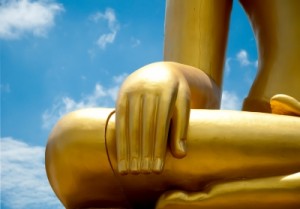Tragedy Led Me To The Dharma

I sometimes think the deaths of my parents led me directly into Buddhism.
When I was fourteen years old my dad was diagnosed with stomach cancer. He was in his early 50s.
I remember when he told me. He had been having stomach problems for a while and he saw a doctor and they found the cancer. Just like that.
At first they thought that he could be treated with surgery. The doctors thought they would simply cut him open and take out his stomach. (apparently we can live without one).
But when they cut him open they noticed the cancer had spread. It had spread much too far and was all over the inside of his body. Taking out his stomach would have risked his life and it wouldn’t have done any good.
This is a thing that happens. It’s not all that rare, really. They waited a few days before they told me. They pronounced his cancer terminal.
Some people get pronounced terminal and they still recover. It happens. But my dad didn’t recover. They put him on aggressive chemotherapy and he lived for eleven months. My mom had to take care of him because there weren’t a lot of things he could do anymore.
His job let him take early retirement. He had worked there for many years. Back then jobs used to do that. I think jobs don’t reward loyalty so much anymore, at least not as often as they used to.
I was around, but I didn’t help much.
I was bullied in school. I was a short kid and bigger kids picked on me. But, after my dad died in my freshman year of high school, I was never bullied again. I have so much faith in humanity because of that. I’m sure the other students imagined, when they heard, what it would be like to lose one of their parents.
My mother was never the same. Losing him took a lot out of her.
Three years later it was my first year of college and my mother was diagnosed with lung cancer.
She had been a lifelong smoker but had quit just a few years before. Not soon enough, clearly. That’s why I’ve never touched cigarettes.
It was like lightning striking twice.
The exact same thing happened. It was too far along to treat with surgery, they did aggressive radiation therapy instead. She lived for close to a year, just like dad. Her job gave her early retirement, just like dad.
The only big difference was this: I had to take care of her. I had to drop out of college for a while. Eventually I did go back, but I didn’t have the college experience that many people have because I was too busy grieving.
Anyway, she died and at the age of 19 I was on my own. I had a big enough inheritance to cover my expenses through college because my parents had good life insurance policies.
I fell into a deep dark hole, as can be imagined. I suffered from anxiety and depression. I saw a therapist and was prescribed an SSRI medication, but it made me a crazy person. I would do things like give strangers great big hugs and I would always say what I was thinking instead of having any sort of filter.
And I quit taking it.
I was grasping at straws, trying to figure out how to get through life.
I heard about meditation. I’m not sure where I first heard of it. I don’t remember. But I decided to try it.
It all started with some books. I read “Meditation in Action” by Chogyam Trungpa and “The Miracle of Mindfulness” by Thich Nhat Hanh. Using these two books I was able to start meditating without having a teacher. It’s good that I was able to do that. My anxiety was severe enough that the thought of going somewhere for a meditation class was terrifying.
I started meditating. I meditated once a week at first, as part of my morning routine. Then I did it three times a week. Then I did it every day. The results were clear and undeniable. I could focus. I could manage my anxiety and stop ruminating all the time. It was really really good for me.
I wanted more and that’s when I started studying Buddhism.
The Four Noble Truths really spoke to me.
I had learned a lot about suffering and impermanence at an earlier age than most. And the Buddha taught the truth of suffering and the way out of suffering. The story of the Buddha says that his mother died when he was very young, but it also says he didn’t have any suffering in life as a child. I like to think we can challenge that narrative. I’m sure he lived a life of luxury and had a lot less suffering than most, especially for the time. But I also think losing his mother probably shaped him to some extent.
There are other Buddhist figures who were orphans too and I identified with them to some extent. Dogen is one. Ikkyu is another.
I actually got really comfortable practicing Buddhism on my own, no teachers and no Sangha. Just study and practice, study and practice.
I ended up going to a local temple around ten years after I discovered meditation. I guess eventually I did start yearning for a sense of community. And I learned that a lot of Buddhists are like me, feeling broken by tragedy, lost and alone.
I trained as a meditation teacher so I could help other people like me.
That was what I needed most of all.
